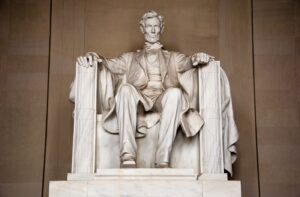After his big announcement on May 9, President Obama now has some serious questions to answer about his position, the first of which is simply, what is marriage? But we should not start this substantive discussion just yet. The president probably believes he can successfully present himself as a sincere new convert to marriage equality who just changed his mind. He was a reluctant bigot, his supporters could even say, but now he has sincerely seen the light (and so, he seems to imply, should we). But if we focus on the timeline of the last few years, any nice conversion story becomes patently absurd.
In 1996, Obama affirmed “I favor legalizing same-sex marriages, and would fight efforts to prohibit such marriages.” (In another document that year he promised his support for a gay marriage resolution in Illinois.) But only two years later, on another questionnaire, he was just “undecided.” Then in 2004, he stated, “I am not a supporter of gay marriage as it has been thrown about, primarily as a strategic issue.” In 2006 he wrote “it is my obligation … to remain open to the possibility that my unwillingness to support gay marriage is misguided.” In 2008 at Saddleback Church, he said “I believe that marriage is the union between a man and a woman.” Again that same year to MTV, “I believe that marriage is the union between a man and a woman. I am not in favor of gay marriage.”
Then, two years after his election, Obama’s public evolution began. In October 2010: “I have been to this point unwilling to sign on to same-sex marriage primarily because of my understandings of the traditional definitions of marriage. But I also think you’re right that attitudes evolve, including mine. … I think it’s fair to say that it’s something that I think a lot about.” In December 2010, he said, “My feelings about this are constantly evolving. I struggle with this.” In June 2011, White House Communications Director Dan Pfeiffer stated, “The president has never favored same-sex marriage. He is against it. The country is evolving on this, and he is evolving on it.” On October 3, 2011, Obama said, “I’m still working on it.” For the next few months it was often reported, and never rejected, that Obama’s opinion was still evolving. Then last week, the administration was lulled out of its slumber by Joe Biden’s bumbling remark on May 6 (which seemed to offer his support for gay marriage), but stuck to the old position that Obama’s opinion was still evolving. Jay Carney stated on May 7 that the President’s opinion “is what it was.” Then, two days later, Obama spoke: “I think same-sex couples should be able to get married.”
So, to summarize: Obama was for gay marriage, before he was undecided, before he was against it, before his feelings were evolving again, before he was both against it and evolving at the same time, before he was simply working on it, before his position was “what it was,” before he was for it again, 16 years after the saga began.
Start your day with Public Discourse
Sign up and get our daily essays sent straight to your inbox.The reactions to his announcement have been almost as interesting as the narrative itself. Some liberal commentators have reacted tepidly, while others are doing their best to celebrate, painting Obama again as a paragon of political courage. But the only way to admire Obama for his transformation on marriage is to refuse to read the timeline. Supporters must prescind from the facts of the case and never look back. (Now I understand Obama’s new motto: Forward.) His two years of “evolution” are either alarmingly morally obtuse or a prolonged and repeated deception. There is no other reasonable interpretation. Even if some still vote for him, they will have to hold their nose on this issue.
The gay marriage argument is not a common policy position like tax rates or oil drilling. It is, as both sides agree, one of paramount importance and significance. It is also, as marriage revisionists always insist, obvious. The day after his big announcement (at George Clooney’s house) Obama made this exact point: “yesterday, we made some news,” Obama said, “but the truth is it was the logical extension of what America’s supposed to be. It grew directly out of this difference in visions. Are we a country that includes everybody and gives everybody a shot and treats everybody fairly?”
But on these terms, Obama’s “evolution” on the issue means that he was deeply conflicted and confused not about a matter of prudence, but about a “logical extension of what America is supposed to be.” For a long time, he apparently could not affirm what he has now described as an obvious application of the idea that we are “a country that includes everybody” and “treats everybody fairly.” If Obama believed all along that the gay marriage issue was one of basic equality and still could not make up his mind, he was strangely confused. If he now sees a direct line from the premise of fundamental fairness to gay marriage, what was holding him back before? The inability to recognize a direct and simple injustice while thinking about it “a lot” for multiple years is not an admirable trait in a president.
Such moral confusion would be distressing, if anyone believed it was genuine. Even the president’s defenders claim that really, Obama personally supported gay marriage all along. But this position would mean Obama is a liar. When Obama’s team claimed from October 2010 that his opinion was “evolving” and he was “still working on it,” they were saying something very different from “no comment.” They, and he, were making an important factual claim about Obama’s state of mind. They were claiming that Obama’s opinion was unsettled, that he had not decided, that he wasn’t sure. If Obama actually supported gay marriage at this time, he was repeatedly lying about his state of mind in those interviews and for that entire year.
Obama and his advocates face a similar dilemma in explaining the last few months. Perhaps Obama’s opinion honestly changed some time between October 2011 and May 2012. Jay Carney claimed the change happened “within the last several months.” But only two days before Obama’s announcement on May 9, Carney himself had stated that Obama’s opinion “is what it was.” Obama knew of the common perception that he had no definite (only an “evolving”) position on gay marriage: he and his surrogates had intentionally cultivated it. He chose not to correct it—it seems not even to his press secretary—even though at some point in this time frame he knew it was false. This is complicity in a serious deception.
We now have an opportunity to pin the president—and those who would vote for him—between the only reasonable interpretations his actions have left open, neither of which is pretty. Any explanation the current Obama can give to his “evolving” years will be baffling when measured against his current statements on his conversion. It will become more and more obvious, as this point is pressed, that he wasn’t being forthright then and probably isn’t now.
After all, what changed between the 2010 interviews (which cited Obama’s personal experience of loving gay couples, prompting him to doubt his original opposition to gay marriage) and the May 9 statement (which also cited personal experience with loving gay couples, but this time for his total conversion)? What exactly confused him about gay marriage in his “evolving” phase if he now claims it is obvious, a clear application of the idea that we are “a country that includes everybody and gives everybody a shot and treats everybody fairly”? How could this “logical” conclusion have taken him two years?
And finally, when did he know he personally supported gay marriage? Between the time he settled his opinion, and his announcement on May 9, why did he allow us to continue to believe a very significant proposition—that he was unsure about gay marriage and did not definitely support it—which he, at that point, knew was directly false? What other common perceptions about his personal opinions, for example his personal support of federalism, his personal belief in robust religious freedom, his personal respect for those who disagree with him, are also, in fact, false? How can we know what he really thinks, if he doesn’t tell us and allows his spokespeople to misrepresent it?
Trying to explain Obama’s marriage narrative just adds more evidence to the increasingly common impression that Obama has an interesting relationship with the truth. This relationship deserves scrutiny, even as we move on to the core of the marriage question.












